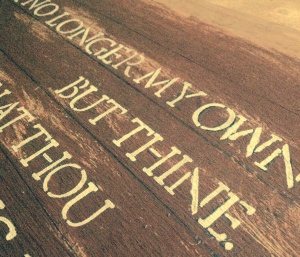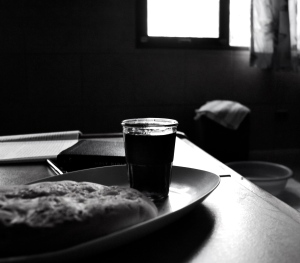I have been able to have wonderful conversations with several people I love recently, and while I’ve had fun catching up, nearly all of them told me stories that absolutely broke my heart.
For now, the stories aren’t important. The broken heart is.
Yesterday while catching up with another friend, my heart nearly physically ached at the culmination of a series of heart-wrenching situations, both others’ and my own, and as he wrapped up his tale I found myself helplessly staring off into the blue sky wondering if my eyes were going to form the tears I felt like crying, mouth slightly open and breath paralyzed, not because of the story itself but because of the sad desperation that surged within me.
this is not how things are supposed to be
Normally, I grimace at the way Christians use the phrase “supposed to.” It shames people for their shortcomings more than anything, and I don’t know that it’s ever really helped someone to tell them, religiously, that they are supposed to be doing this or that. For me, it’s only ever made me feel angry and disempowered and sinful; discouraged and incapable, not spurred on to righteousness.
But in this sense, when we feel like weeping upon the news of a friend’s mess, only because we know all too well our capacity to make our own – the mess we spend all of our time trying to pick up, hoping no one will notice and wishing someone would just show us her mess, too, so we didn’t feel so alone;
in this sense, when we’re forced to confront our weaknesses
or when the relationship didn’t end the way it began
or when everything perfect in our lives is only a memory
or when we finally admit that life isn’t at all what we’d dreamed,
the same cry comes from within all of us,
this is not how things are supposed to be,
and “supposed to” is absolutely the correct phrasing.
I think that cry is one of the things we all have in common, Christian or non. We’ve all been disappointed, put all of our hope in something only to be let down in the deepest place, forced to admit there are some things we can strive for and never earn or gain or have. We can give something our all, and it still might not be enough.
My heart has hurt enough to believe the ache must be indicative of something.
This is the tether on my ankle that will never let me leave God, this idea that there once was Paradise, that we were made to be there, and now, we are not, though our hearts are still synchronized to the rhythm of our original intention. We feel the disjointedness of this life’s rhythm and our heart’s beat in every failure and sickness, every sin and every death.
These seasons of my life where things are hard and gritty and it’s difficult for me to remember what’s important or true, where I have to write myself notes that say “God is real” and “the gospel is still true” to find when I wake up in the morning, are the ones that bring me most graciously back to this place of remembering that this is not how things are supposed to be.
In hearing the story from my friend yesterday, I was reminded again.
I survived with a heavy heart the rest of the afternoon, wandering around wondering after it all, feeling sad and hopeless for the world, for the state it’s in, for all the people I know whose lives haven’t become what they hoped and are hopelessly stuck in a rut of self-hatred and other-hatred because of it, and for myself. I was sobered by the inevitable disappointment we face.
In the midst of asking God and myself what we do in light of this uninviting reality, I received a text reminding me that tomorrow was World Communion Sunday, when the Church worldwide celebrates at the table together.
Communion.
Many of my friends have lovingly, apologetically, awkwardly laughed at me during Communion, because for the last three years or so, I haven’t been able to participate in it without crying.
It is the most sacred thing in the world to me, one of the holiest things we do, because it’s where Paul’s words to the Galatians – “all are one in Christ Jesus” – come alive before our very eyes. It’s where we watch the modern day Church meet the ancient Church at the same table of the same Lord to partake of the same bread and wine that represent the same ancient salvation for all people. It’s where the Church agrees together that this bread and wine is what gives us purpose, wholeness, completeness, forgiveness, unity and salvation.
And what is Communion if not remembrance that something happened so long ago to right this wrong that our heart aches to indicate,
to put right what was undone at the beginning of humanity,
to celebrate Love that has saved us from ourselves and this unpredictable, volatile world that leaves us disappointed and insufficient to arrange for our own lasting happiness,
and to know with full assurance that Paradise will one day again be our home?
We celebrate in Communion the body that was born to be broken for the brokenness we bear.
After I read the text, I broke down crying. I really haven’t stopped since. So many times in all the stories over the last couple of weeks my heart has broken for the brokenness in me and in those around me, for our unhappiness and for her shame and for his pride and for her judgment and for his struggle and for my resentment and unforgiveness and grief and loneliness.
This morning, I brought those heartaches to the Table and offered them there, between the softness of the bread and the tartness of the wine, and I was reminded that, unfortunately,
this is not how things are supposed to be
is our present reality.
But the Table, Communion, reminded me of what I had lost sight of – that fortunately, Love has outdone our heartache, and though we may suffer disappointment and failure, the message of the Table rings stronger and truer than the sadness and despair of a broken world, and we can rest knowing that one day,
things will be exactly how they were supposed to be,
and our hearts will still be synchronized to the rhythm of our original intention;
but they won’t ever ache.
m
happy world communion sunday.


